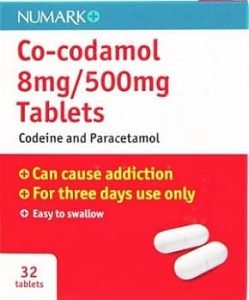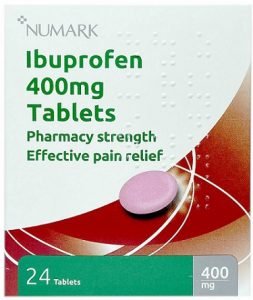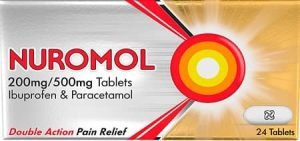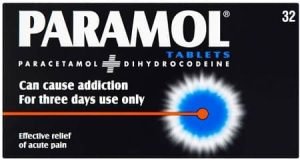A toothache is one of the most excruciating and distressing pains that can strike anyone unexpectedly, causing immense discomfort and disrupting daily life. Whether it’s a throbbing ache or a sharp shooting pain, the need for swift relief becomes paramount. Seeing a dentist to investigate the cause of pain is crucial. In the meantime, the patient may consider the use of over the counter medicines to manage the pain. Although it is difficult to point out the single best pain reliever for toothache, patients may see pain reduction with any of the drugs reviewed below. A combination of two or even three different products is possible with over the counter medicines. I will discuss the main painkillers available in pharmacies for the management of toothache. I will also list a few prescription-only drugs which can be prescribed by a dentist.
Table of Contents
- 1. Paracetamol for dental pain
- 2. Paracetamol Plus
- 3. Best pain reliever for toothache: Nonsteroidal Anti-inflammatory Drugs (NSAIDs)
- 4. Nurofen Express
- 5. Nuromol Dual Action pain reliever for toothache
- 6. Aspirin
- 7. Anadin Extra
- Codeine combination products as pain relief for a toothache
- 8. Codeine and paracetamol (Co-codamol)
- 9. Codeine and ibuprofen
- 10. Dihydrocodeine and paracetamol – Co-dydramol (Paramol) as a pain reliever for a toothache
- 11. Local anaesthetic gels as a pain reliever for a toothache
- Prescription-only medicines for a toothache
- Best pain reliever for toothache: Conclusion
1. Paracetamol for dental pain
Paracetamol is a ‘gold standard’ in the management of pain. Customers can purchase paracetamol over the counter in all supermarkets, pharmacies and ‘corner’ shops. Adults who experience severe pain, need to maximise the use of paracetamol by taking the full recommended dose. The recommended dose for paracetamol in adults and children over 16 years is 1 to 2 tablets, taken every 4-6 hours, as required. Don’t take more than eight tablets (4 doses) in any 24 hours.
Paracetamol helps to reduce pain and fever (high temperature) if present. High temperature with a toothache is possible when a dental abscess (infection) is present.
Paracetamol can be taken with other pain relief drugs for toothache such as Nonsteroidal Anti-inflammatory Drugs (NSAIDs), which are discussed in the next paragraph.
Is paracetamol the best pain reliever for a toothache?
Paracetamol is considered an effective painkiller for toothache. When taken in combination with NSAIDs such as ibuprofen, paracetamol has been shown to be more effective in pain reduction than combination products containing codeine (Teoh, 2020).
2. Paracetamol Plus
Many pharmacies and outlets sell paracetamol in combination with caffeine. There is some evidence to suggest that caffeine may enhance the effectiveness of paracetamol.
Several studies have explored the combination of paracetamol and caffeine, particularly in treating headaches and migraines. The theory behind this combination is that caffeine may enhance the absorption and distribution of paracetamol, potentially increasing its analgesic (pain-relieving) effects. Additionally, caffeine itself has mild pain-relieving properties and can help to constrict blood vessels, which might be beneficial in certain types of headaches.
3. Best pain reliever for toothache: Nonsteroidal Anti-inflammatory Drugs (NSAIDs)
Ibuprofen is the most common NSAID available over the counter. Customers can purchase ibuprofen 200mg in shops and pharmacies, where a product is available for self-selection, however, limited in pack size of 16 tablets. It is possible to buy ibuprofen 400mg tablets from a pharmacy counter and up to 100 tablets.
Ibuprofen has two actions in the body. It reduces fever and inflammation. As anti-inflammatory drug ibuprofen is less effective than other (prescription) NSAIDs; however, it is associated with a lower possibility of side effects.
Similarly to paracetamol, ibuprofen should be taken at a maximum dose to get the best pain relief effect. The maximum recommended adult daily dose for ibuprofen 400mg is one tablet to be taken up to three times a day (when required).
Ibuprofen can be used together with paracetamol at the same time (adults). One branded combination product, which contains paracetamol and ibuprofen, exists.
4. Nurofen Express
Nurofen Express is a branded version of ibuprofen which comes with a higher price tag. Nurofen Express is sold in the form of tablets which contain ibuprofen lysine and liquid capsules. ibuprofen lysine is a salt form that is more soluble in water, potentially allowing for quicker absorption when taken orally (gets to work faster). Similarly, Nurofen Express with liquid ibuprofen capsules is advertised as providing fast pain relief. Customers who choose Nurofen Express over standard ibuprofen may get some faster relief from the pain but the overall difference in effectiveness between formulations is minimal.
No products found.
5. Nuromol Dual Action pain reliever for toothache
Nuromol tablets contain a combination of paracetamol with ibuprofen in one tablet. Information provided by the manufacturer of Nuromol suggests that this drug is more effective as a painkiller as compared to taking individual drugs alone. Nuromol provides stronger and longer-lasting pain relief according to clinical data.
Nuromol is a general sale medication, which means it can be purchased in shops, supermarkets and pharmacies.
NSAIDs effectiveness in acute toothache
NSAIDs are regarded as the first option when it comes to the management of dental pain. Some evidence exists, which suggests NSAIDs are better for toothache than opioids such as codeine (Teoh, 2020) owing to that not only NSAIDs reduce pain, but also swelling and hyperalgesia (sensitivity to the pain).
NSAIDs, together with paracetamol, are regarded as the first-line option in the management of toothaches.
6. Aspirin
Aspirin also belongs to the NSAIDs group of drugs. Aspirin is used in the management of pain, including toothaches. When used as a painkiller, the standard formulation of aspirin contains 300mg of aspirin as an active ingredient. This higher dose differs from a low-dose aspirin (baby aspirin), which some people take daily as secondary prevention of cardiovascular diseases, such as deep-vein thrombosis (formation of a blood clot in the vein) or pulmonary embolism (formation of a blood clot in blood vessels found in the lungs).
7. Anadin Extra
Worth mentioning, Anadin Extra tablets offer a triple combination of aspirin, paracetamol and caffeine. Advertised as medication which gets to work in 5 minutes, based on caffeine absorption (how fast caffeine gets into the body).
Anadin Extra comes now as a soluble formulation. Soluble tablets typically work faster than regular tablets. The reason for this is that soluble tablets are designed to dissolve quickly in water or other liquids, which allows the medication to be absorbed more rapidly into the bloodstream. On the other hand, regular tablets need to be broken down by the digestive system before the active ingredients can be absorbed.
Codeine combination products as pain relief for a toothache
A variety of combination products can be purchased from a pharmacy to manage toothache. Some combination drugs are recommended (licensed) when customers tried first-line painkillers such as paracetamol or ibuprofen and did not get sufficient pain relief. This rule usually applies to over the counter combination drugs containing codeine. Combination products containing codeine are available in different forms (tablets, capsules and effervescence tablets). The amount of codeine per tablet differs between brands of codeine-containing products. Some may regard codeine-containing medicines as the best pain reliever for toothache; however, the evidence suggests otherwise.
Is codeine the best pain reliever for toothache?
Use of codeine in dental pain has limited use. Many customers request over the counter co-codamol to help with toothache. Perhaps one benefit of codeine is that it can cause drowsiness and sedation, which may be favourable when a toothache is experienced at night.
Several studies have demonstrated that taking paracetamol with codeine does not improve pain control as compared, for example, to taking ibuprofen and paracetamol in combination. In one study of 131 dental patients (surgical removal of a molar), the addition of codeine 60mg to a combination of paracetamol and ibuprofen was not more effective in reducing the pain as compared to treatment with both ibuprofen and paracetamol (Best et al., 2017).
A review of 23 clinical trials involving patients with post-operative pain concluded that taking ibuprofen is more effective than taking paracetamol or paracetamol and codeine (BMJ, 2000).
Codeine products for toothache – limit on use
Products which contain codeine should not be used for more than three days when purchased over the counter. The limit on the use of codeine products reflects the addictive properties of codeine.
Possible side effects of codeine products
Taking codeine and codeine-containing product is associated with side effects. The most common side effect which may be experienced are:
- Nausea (feeling sick)
- Drowsiness/sedation (feeling sleepy)
- Constipation (Can be treated with over the counter laxatives)
Lastly, there is a variation in response to codeine between people who take codeine. In simple terms, some people may experience little effect from codeine, while others may be affected much more and experience several side effects, even with products taken over the counter.
8. Codeine and paracetamol (Co-codamol)

Co-codamol is one of the most commonly requested over the counter painkillers. Co-codamol can be considered an analgesic option to relieve acute moderate pain, including toothache, which is not managed successfully by other analgesics such as paracetamol or ibuprofen (alone).
‘Standard’ co-codamol tablet contains 500mg of paracetamol and 8mg of codeine. Co-codamol is available as tablets or effervescent tablets, which dissolve in water. Most pharmacies sell co-codamol as their own branded product, which is usually the cheapest option. Plenty of other brands exist, for example, Veganin, which do not differ a lot in terms of active ingredients.
Some brands of codeine products contain more than 8mg of codeine per tablet, for example, the Solpadine range of co-codamol:
Solpadeine Max Tablets (codeine, paracetamol)
- 12.8mg of codeine and 500mg of paracetamol per tablet
- Available in ‘standard’ tablet formulation and in the form of effervescent tablets
- Suitable for children and adults from 12 years of age
- An adult can take two tablets up to 4 times a day.
Solpadine Plus (caffeine, codeine, paracetamol)
- 8mg of codeine, 500mg of paracetamol and 30mg of caffeine per capsule
- Available in capsule forms or as effervescent tablets
- Suitable for children and adults from 12 years of age
- An adult can take two tablets up to 4 times a day.
Related post: Solpadeine alternative painkillers.
Can you take co-codamol with other painkillers?
Co-codamol can be taken together with ibuprofen, but not with paracetamol.
9. Codeine and ibuprofen
Codeine can also be bought in combination with ibuprofen. Nurofen Plus contains 200mg of ibuprofen and 12.8mg of codeine per tablet. Nurofen Plus can be used by adults and children over 12 years of age.
Similarly to co-codamol, Nurofen Plus is licensed for the management of acute pain such as toothache, which is not relieved by simple analgesics such as paracetamol, ibuprofen or aspirin alone.
Nurofen Plus (codeine & ibuprofen) can be taken alongside paracetamol. The use of Nurofen Plus is limited to three days only.
10. Dihydrocodeine and paracetamol – Co-dydramol (Paramol) as a pain reliever for a toothache
Paramol tablets are made up of a combination of two active ingredients: paracetamol 500mg and dihydrocodeine 7.46mg per tablet, commonly known as Co-dydramol. Similarly to co-codamol, co-dydramol is a weak opioid. It has similar pain relief properties to that of codeine. With higher doses (prescription-only), dihydrocodeine may offer additional pain relief; however, higher doses can be associated with nausea and vomiting (BNF, 2020).
Effectiveness of co-dydramol as a pain reliever in toothache
Customers who consider taking over the counter co-dydramol may not experience a significant benefit in relieving toothache. No specific studies compared the effectiveness of co-dydramol with other analgesics. One study which looked at the efficacy of dihydrocodeine as compared to ibuprofen as a single dose in post-operative patients concluded that ibuprofen (400mg) is better than either dihydrocodeine 30mg or 60mg (Cochrane, 200-).
11. Local anaesthetic gels as a pain reliever for a toothache
Local anaesthetic gel offers an additional treatment option for people who experience toothache pain. Local anaesthetic gels are used as temporary relief from a toothache. Oral gels are applied locally into the tooth cavity. In the UK, Orajel is the local anaesthetic gel which is used as a pain reliever for toothache.
Orajel is sold as two different products:
- Orajel Dental Gel (local anaesthetic: 10% benzocaine) is a general sale product available for self-selection by customers, for example in supermarkets, pharmacies and online.
- Orajel Extra Strength (local anaesthetic: 20% benzocaine) is available as a pharmacy-only product (sold from behind a pharmacy counter).
No products found.
Orajel Dental and Orajel Extra Strength can be used by adults and children over 12 years of age.
Orajel can be used alongside other analgesics such as paracetamol and ibuprofen.
Is Orajel useful as a pain reliever for toothache?
A study of 576 participants with acute toothaches found that benzocaine 10% and 20% is more effective than a placebo (a dummy product) when applied locally to an open tooth cavity and surrounding oral tissues. Benzocaine 20% was more effective in relieving pain than 10% gel. Overall, the study concluded that Orajel is effective, and well-tolerated, and patients can use it safely as a temporary treatment of toothache (Hersh et al., 2013).
Prescription-only medicines for a toothache
NHS dentist (appointment)
A dentist may prescribe a painkiller to help manage toothache pain. Only limited drugs can be prescribed by a dentist when an NHS dental prescription is issued. In terms of pain management, only the following medicines can be prescribed on NHS dental prescription:
- Aspirin
- Diclofenac Sodium Tablets
- Dihydrocodeine Tablets (30mg)
- Paracetamol tablets and oral solution
As we can tell, the options are limited in terms of pain management, although diclofenac (another NSAID) is a more effective pain reliever as compared to ibuprofen. Dihydrocodeine 30mg is a prescription-only medication. Some patients may find a higher dose of dihydrocodeine more effective in reducing pain than over the counter preparation containing codeine or dihydrocodeine, however at the expense of side effects.
Private dentist
A dentist can prescribe almost any medicines when a private prescription is issued. Prescribing drugs on a private prescription broadens the choice of painkillers. Dentists can not legally write a private prescription for ‘stronger’ painkillers, for example, schedule 3 controlled drugs (e.g. Tramadol) or schedule 2 controlled drugs, such as morphine-based drugs, e.g. morphine sulphate tablets.
Alternative options of drugs which may be prescribed by a dentist on private prescription include:
- Naproxen: first choice when it comes to prescribing NSAID (same class of drugs as ibuprofen or diclofenac). Naproxen is more effective than ibuprofen, with similar effectiveness to diclofenac, however with a low occurrence of side effects. Learn more about naproxen and naproxen alternative drugs.
- Co-codamol: higher strength of co-codamol tablets or capsules such as co-codamol 30/500 (30mg of codeine and 500mg of paracetamol)
- Ibuprofen: higher strengths of ibuprofen (above 400mg) exist, for example, ibuprofen 600mg tablets or ibuprofen 800mg modified-release tablets. When prescribed, ibuprofen can be taken at a higher dose than ibuprofen purchased over the counter. A dentist or doctor can prescribe ibuprofen with the highest dose of up to 600mg of ibuprofen taken four times a day (maximum daily dose 2400mg, maximum daily dose for over the counter ibuprofen is 1200mg)
- Meptazinol (brand name Meptid): another option for prescription-only opioids, which is used in short-term management of moderate pain.
Best pain reliever for toothache: Conclusion
Paracetamol and ibuprofen (NSAID) should be considered first-choice medicines in the management of toothache. Both drugs are available in a variety of many generic and branded products and can be taken at the same time. Taking combination products of paracetamol and ibuprofen (Nuromol) may offer better control of pain. Patients can use additional numbing gels, such as Orajel. Taking codeine-containing medication may improve pain relief, however, taking codeine comes with the possibility of side effects.
References
Best AD, De Silva RK, Thomson WM, Tong DC, Cameron CM, De Silva HL. Efficacy of Codeine When Added to Paracetamol (Acetaminophen) and Ibuprofen for Relief of Postoperative Pain After Surgical Removal of Impacted Third Molars: A Double-Blinded Randomised Control Trial. J Oral Maxillofac Surg. 2017 Oct;75(10):2063-2069. doi: 10.1016/j.joms.2017.04.045. Epub 2017 May 15. PMID: 28586638. Available at: https://doi.org/10.1016/j.joms.2017.04.045 Accessed on 31/07/2023
BMJ (2000). Non-steroidal anti-inflammatory drugs. Available at: https://doi.org/10.1136/bmj.320.7241.1058 Accessed on 29/07/2023
BNF (2020). Analgesics. Available at: https://bnf.nice.org.uk/treatment-summary/analgesics.html Accessed on 29/07/2023
Hersh EV, Ciancio SG, Kuperstein AS, et al. An evaluation of 10 percent and 20 percent benzocaine gels in patients with acute toothaches: efficacy, tolerability and compliance with label dose administration directions. J Am Dent Assoc. 2013;144(5):517-526. doi:10.14219/jada.archive.2013.0154 Available at: https://www.ncbi.nlm.nih.gov/pmc/articles/PMC3844156/ Accessed on 29/07/2023
Teoh L. Managing acute dental pain without codeine. Aust Prescr. 2020;43(2):64. doi:10.18773/austprescr.2020.013 Available at: https://dx.doi.org/10.18773%2Faustprescr.2020.013 Accessed on 28/07/2023







![Nuromol REVIEW – is it worth it? [ANSWERED]](https://chemist.onl/wp-content/uploads/2022/11/nuromol-review-e1667890006673-450x400.jpg)